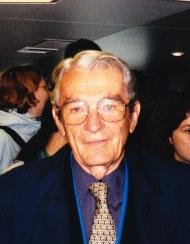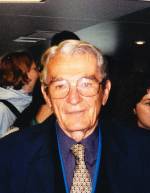Ivar Giaever (born April 5, 1929, in Bergen, Norway) is a physicist who shared the Nobel Prize in Physics in 1973 with Leo Esaki and Brian Josephson "for their discoveries regarding tunnelling phenomena in solids". Giaever's share of the prize was specifically for his "experimental discoveries regarding tunnelling phenomena in superconductors". Giaever is an institute professor emeritus at the Rensselaer Polytechnic Institute, a professor-at-large at the University of Oslo, and the president of Applied Biophysics.
Early life and education
Giaever earned a degree in mechanical engineering from the Norwegian Institute of Technology in Trondheim in 1952. In 1954, he emigrated from Norway to Canada, where he was employed by the Canadian division of General Electric. He moved to the United States two years later, joining General Electric's Research and Development Center at Schenectady, New York, in 1958. He has lived in Niskayuna, New York, since then, taking up US citizenship in 1964. While working for General Electric, Giaever earned a Ph.D. from the Rensselaer Polytechnic Institute in 1964.
The Nobel PrizeThe work that led to Giaever's Nobel Prize was performed at General Electric in 1960. Following on Esaki's discovery of electron tunnelling in semiconductors in 1958, Giaever showed that tunnelling also took place in superconductors, demonstrating tunnelling through a very thin layer of oxide surrounded on both sides by metal in a superconducting or normal state. Giaever's experiments demonstrated the existence of an energy gap in superconductors, one of the most important predictions of the BCS theory of superconductivity, which had been developed in 1957. Giaever's experimental demonstration of tunnelling in superconductors stimulated the theoretical physicist Brian Josephson to work on the phenomenon, leading to his prediction of the Josephson effect in 1962. Esaki and Giaever shared half of the 1973 Nobel Prize, and Josephson received the other half.
Giaever's research later in his career was mainly in the field of biophysics. In 1969, he researched Biophysics for a year as a fellow at Clare Hall, University of Cambridge, through a Guggenheim Fellowship, and he continued to work in this area after he returned to the US.
He has co-signed a letter from over 70 Nobel laureate scientists to the Louisiana Legislature supporting the repeal of Louisiana’s creationism law, the Louisiana Science Education Act.
Other prizesIn addition to the Nobel Prize, he has also been awarded the Oliver E. Buckley Prize by the American Physical Society in 1965, and the Zworykin Award by the National Academy of Engineering in 1974. He is a member of the Norwegian Academy of Science and Letters.
Views on global warmingAccording to The Wall Street Journal, Giaever has described man-made global warming as a "new religion," with references to a report released by the U.S. Senate Environment and Public Works Committee (minority), led by Jim Inhofe, in March 2009. The report states that Giaever has said "I am a skeptic… Global warming has become a new religion."
In a featured story in Norway's largest newspaper, Aftenposten, 26 June 2011, Giaever stated, "It is amazing how stable temperature has been over the last 150 years."
On 13 September 2011, though honored as a Fellow, Giaever resigned from the American Physical Society over its official position noting: "In the APS it is ok to discuss whether the mass of the proton changes over time and how a multi-universe behaves, but the evidence of global warming is incontrovertible?"
As part of the 62nd Lindau Nobel Laureate Meeting, Giaever referred to agreement with the evidence of climate change as a "religion" and commented on the significance of the apparent rise in temperature when he stated "What does it mean that the temperature has gone up 0.8 degrees? Probably nothing." Referring to the selection of evidence in his presentation, Giaever stated "I pick and choose when I give this talk just the way the previous speaker picked and chose when he gave his talk." Giaever concluded his presentation with a pronouncement: "Is climate change pseudoscience? If I’m going to answer the question, the answer is: absolutely."


























